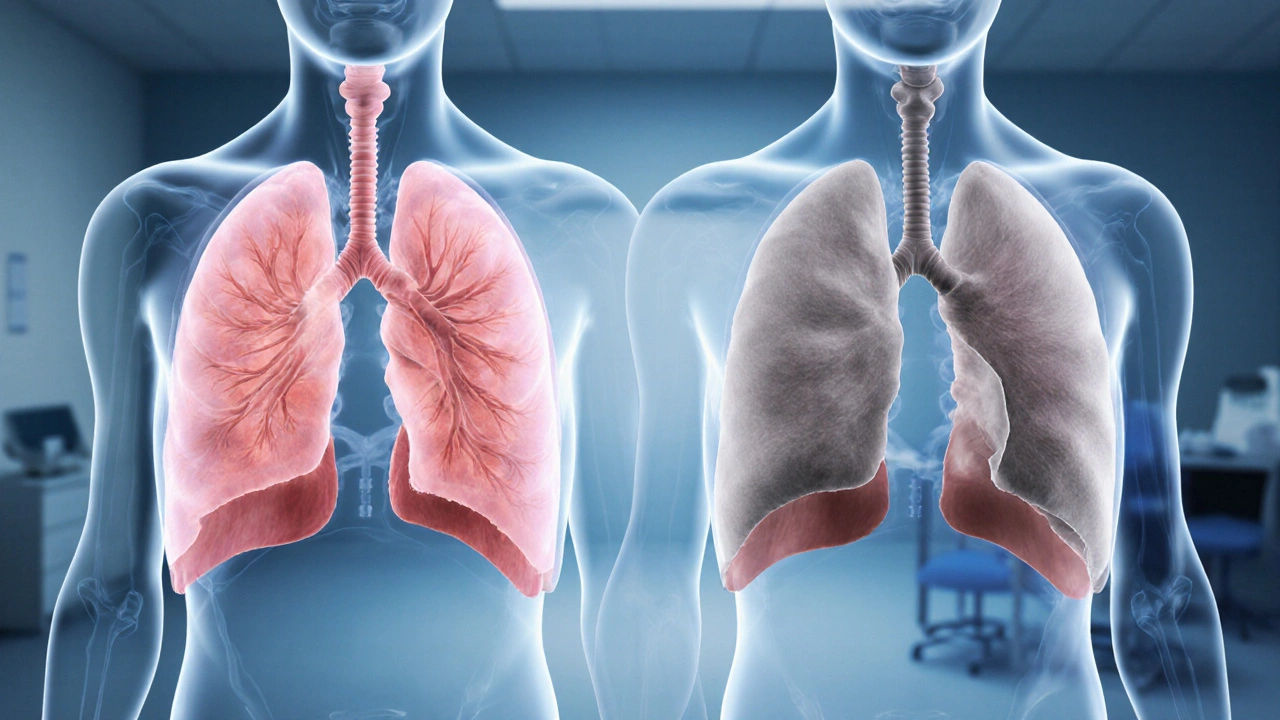
Understanding Emphysema: Causes, Symptoms, and Treatment Guide
Learn what emphysema is, its main causes, warning symptoms, and effective treatment options to manage this chronic lung disease.
When dealing with emphysema, emphysema, a progressive lung disease that destroys alveolar walls and reduces airflow, you’re actually facing one facet of COPD, chronic obstructive pulmonary disease, a group of conditions that block airflow. The biggest driver behind its development is smoking, the inhalation of tobacco smoke that triggers inflammation and tissue damage, though genetic factors and polluted air also play roles. To keep breathlessness at bay, doctors frequently prescribe inhaler therapy, medications delivered directly to the lungs via bronchodilators or steroids. Complementing drugs, pulmonary rehabilitation, a structured program of exercise, education, and breathing techniques can boost stamina and quality of life.
Typical symptoms start subtly: a lingering cough, occasional wheeze, and shortness of breath that worsens during chores or a brisk walk. Over time, the breathlessness becomes constant, and even simple conversations can feel exhausting. Because the damage is irreversible, early recognition matters—catching the disease before frequent flare‑ups can slow progression. Doctors use a combination of patient history, physical exam, and specific tests to confirm the diagnosis.
Spirometry is the gold‑standard test. It measures the volume of air you can force out in one second (FEV1) and compares it to the total amount you can exhale (FVC). A reduced FEV1/FVC ratio confirms airflow obstruction consistent with emphysema. Chest X‑rays and high‑resolution CT scans add visual proof, showing enlarged air spaces and flattened diaphragms. Blood gas analysis may reveal low oxygen levels, especially during advanced stages.
Treatment isn’t limited to inhalers. Long‑acting bronchodilators relax airway muscles, while inhaled corticosteroids reduce inflammation. For patients with severe disease, oxygen therapy at home delivers supplemental air, easing strain on the heart and improving sleep. In select cases, lung volume reduction surgery or even a transplant can be considered, but these options require thorough evaluation and specialist referral.
Quitting smoking tops the list of life‑changing steps. Even after years of use, stopping can slow lung function decline and improve response to medications. Counseling, nicotine replacement, and prescription aids like varenicline all boost quit rates. Beyond smoking, protecting your lungs from occupational dust, chemical fumes, and indoor pollutants helps prevent further damage.
Nutrition plays a subtle yet vital role. Emphysema can increase the work of breathing, raising calorie needs. A balanced diet rich in protein, healthy fats, and antioxidants supports muscle strength and immune health. Staying up to date with flu and pneumonia vaccines reduces the risk of infections that could trigger dangerous flare‑ups.
When an exacerbation strikes—marked by sudden worsening of cough, increased sputum, or fever—prompt action is crucial. Antibiotics target bacterial infections, while short courses of oral steroids reduce airway swelling. Many patients keep an emergency plan handy: a rescue inhaler, a written list of medications, and clear instructions on when to call their healthcare team or head to the emergency department.
Living with emphysema isn’t just a medical journey; it’s an emotional one too. Support groups, both online and in‑person, let you share experiences, swap coping tips, and find encouragement. Pulmonary rehab classes often include counseling components, helping you manage anxiety or depression that can accompany chronic breathlessness. With the right mix of medication, lifestyle changes, and community support, many people maintain an active, fulfilling life despite the diagnosis.
Below you’ll find a curated selection of articles that dive deeper into each of these topics—from quitting smoking strategies to detailed guides on inhaler techniques and rehab programs—so you can explore practical steps and expert insights tailored to emphysema management.

Learn what emphysema is, its main causes, warning symptoms, and effective treatment options to manage this chronic lung disease.